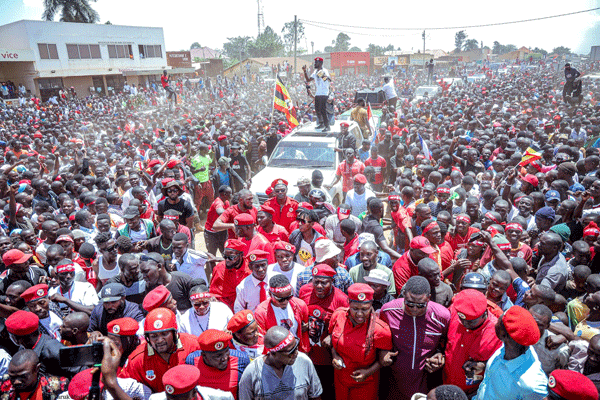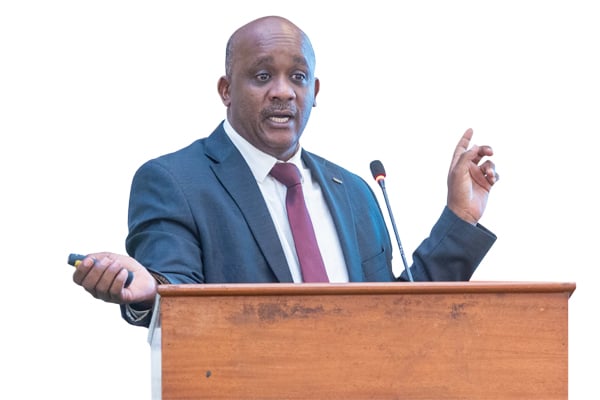Prime
EU says it will not cut aid over anti-gay law

Thousands of Muslims participate in the anti-gay walk in Jinja City in February. The EU has decided to maintain its funding to Uganda despite the enactment of the Anti-Homosexuality Act. PHOTO/TAUSI NAKATO
What you need to know:
- The EU will continue supporting vulnerable communities and maintain engagement with Ugandan authorities to promote equal treatment for LGBTQI individuals.
In a decision that has sent shockwaves through pro-gay advocacy groups, the European Union (EU) has announced its intent to maintain its funding to Uganda, despite the enactment of the contentious Anti-Homosexuality Act.
In a written statement released on Wednesday to the European Parliament, Ms Jutta Urpilainen, the European Commissioner for International Partnerships, expressed that halting financial assistance to Uganda due to the law that imposes punitive sentences for specific same-sex activities would result in withholding crucial support from vulnerable communities.
“At this moment, the EU considers that a suspension of EU financial support to Uganda would deprive the most vulnerable populations, including LGBTQI persons, from vital support. Disengagement by the EU would also create gaps which may be further filled by other players who do not share EU values,” the statement reads in part.

European Commissioner for International Partnerships Jutta Urpilainen speaks during a press conference on the Global Gateway at the EU headquarters in Brussels, on December 01, 2021. PHOTO/AFP
Ms Urpilainen adds: “Therefore, the EU will continue to use all opportunities of engagement with the Ugandan authorities and civil society, including in the context of its development cooperation and broader partnership, to ensure that all individuals, regardless of their sexual orientation and gender identity, are treated equally”.
Respite
Ms Urpilainen explained that top EU authorities had already expressed deep concerns with the promulgation of the law, and that they have raised the issue with the “Ugandan government, Parliament and President”.
The EU position, which was confirmed by representatives in Kampala, will come as a relief to the Ugandan authorities. Uganda’s Western allies have been critical of the government since the enactment of the law.
United States President Joe Biden branded the law as a tragic violation of universal human rights as his officials led by Secretary of State Antony Blinken threatened sanctions, including visa restrictions on Ugandan officials.
The US has since imposed visa restrictions on some officials. The toughest response has come from the World Bank, which last month announced that it would be freezing all new public financing to Uganda.
President Museveni has led other government officials in open defiance to the threats by the country’s Western allies. In response to the World Bank, for example, the incumbent said Uganda will cut down on its borrowing appetite but would never give in to pressure.
The EU decision also came hours after the National Unity Platform (NUP) party leader Robert Kyagulanyi, alias Bobi Wine, called upon the EU and the US to stop funding the ruling National Resistance Movement (NRM) government.

National Unity Platform (NUP) party leader Robert Kyagulanyi, alias Bobi Wine, addresses supporters in Mayuge District on September 4, 2023.
In June, Mr Tomas Tobé, the chairperson of the European Parliament’s Development Committee, wrote to Josep Borrell Fontelles, the vice president of the European Commission High Representative of the Union for Foreign Affairs and Security Policy, terming the enactment of the anti-homosexuality law as an unacceptable and “flagrant violation of human rights and fundamental freedoms”.
“The law will have far-reaching implications such as undermining progress in combating HIV and damaging the country’s reputation as a destination for foreign investment and development assistance,” Mr Tobé added.
He called for action. “I urge the Commission, under your supervision, to ensure the EU sends a strong message to the Ugandan authorities that the EU will never accept anti-LGBTQI legislation or any type of legislation that violates human rights and fundamental freedoms”.
He added: “The EU must use all the tools available to it such as taking action under the ‘essential elements’ clause of the Cotonou Agreement, while also increasing support for Ugandan human rights defenders and lawyers seeking to challenge the law in court”.
Reprimand call
In response to the EU decision, Dr Frank Mugisha, a gay rights activist, and peace advocate, urged the EU to find alternatives for reallocating its financial assistance.
“An effective response is one that fine-tunes and reallocates EU assistance to Uganda in ways that ensure those who spout hatred and catalyse violence and discrimination against LGBTQI people—including Ugandan government officials—won’t benefit from EU taxpayers’ money,” Dr Mugisha said.
He added: “The dilemma presents the EU with a proper rostrum to have a legible say on the fate of queer minorities in Africa broadly. The law in Uganda is just a festering wound that will soon metastasise. So, the EU should tell us how it fights for queer rights”.

President Museveni during a meeting with the directors of BRIDGIN Schools led by Mirjam Blaak who is the Ugandan Ambassador to Belgium, the Netherlands, Luxembourg and the European Union (EU) at State House Entebbe on July 25, 2023. PHOTO/ PPU
The EU is one of the top funders of the Ugandan government and cutting down on aid would seriously hamper many development projects.
The EU also provides Uganda with humanitarian aid through the Directorate-General for European Civil Protection and Humanitarian Aid Operations (DG-ECHO).
Jutta Urpilainen statement in full
“The EU is leading the call for equality of lesbian, gay, bisexual, trans-sexual, queer, and intersex (LGBTQI) persons around the world, by implementing actions supporting their rights as per the LGBTQI Equality Strategy (2020-2025) and the EU Action Plan on Human Rights and Democracy (2020-2024). The EU continues to support LGBTQI equality in the multilateral fora and in bilateral meetings.
The EU has expressed its deep concerns with the promulgation of the Ugandan Anti-Homosexuality Act. High-level EU officials have raised the issue with the Ugandan Government, Parliament and President.
In this dialogue, the EU emphasised that the criminalisation of homosexuality is contrary to the principles of equality and non-discrimination in the Universal Declaration of Human Rights, and the African Charter on Human and People’s Rights.
At this moment, the EU considers that a suspension of EU financial support to Uganda would deprive the most vulnerable populations, including LGBTQI persons, from vital support.
Disengagement by the EU would also create gaps, which may be further filled by other players who do not share EU values.
Therefore, the EU will continue to use all opportunities of engagement with the Ugandan authorities and civil society, including in the context of its development cooperation and broader partnership, to ensure that all individuals, regardless of their sexual orientation and gender identity, are treated equally.
In that perspective, the EU is stepping up its support to civil society and LGBTQI defenders, by promoting the universality of human rights and the principle of non-discrimination, and opposing the death penalty, with a specific focus on the protection of people and civil society organisations at risk.”




